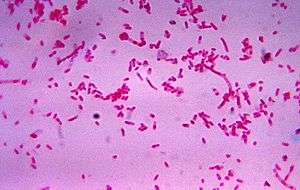Fusobacteria
Fusobacteria are obligately anaerobic non-sporeforming Gram-negative bacilli. Since the first reports in the late nineteenth century, various names have been applied to these organisms, sometimes with the same name being applied to different species. More recently, not only have there been changes to the nomenclature, but also attempts to differentiate between species which are believed to be either pathogenic or commensal or both. Because of their asaccharolytic nature, and a general paucity of positive results in routine biochemical tests, laboratory identification of the fusobacteria has been difficult. However, the application of novel molecular biological techniques to taxonomy has established a number of new species, together with the subspeciation of Fusobacterium necrophorum and F. nucleatum, and provided new methods for identification. The involvement of fusobacteria in a wide spectrum of human infections causing tissue necrosis and septicaemia has long been recognised, and, more recently, their importance in intra-amniotic infections, premature labour and tropical ulcers has been reported.
| Fusobacteria | |
|---|---|
 | |
| Fusobacterium novum in liquid culture | |
| Scientific classification | |
| Domain: | Bacteria |
| Phylum: | Fusobacteria Garrity & Holt 2012 |
| Class: | Fusobacteriia Staley & Whitman, 2012 |
| Order: | Fusobacteriales Staley & Whitman, 2012 |
| Families and genera[1] | |
| |
Since the first reports of fusobacteria in the late nineteenth century, the variety of species names has led to some confusion within the genera Fusobacterium and Leptotrichia. However, newer methods of investigation have led to a better understanding of the taxonomy, with the description of several new species of fusobacteria. Among the new species described are F. ulcerans from tropical ulcers, and several species from the oral cavity. Subspeciation of the important species F. necrophorum and F. nucleatum has also been possible. It is probable that the taxonomy of the fusobacteria may be further developed in the future.[2]
Phylogeny
The currently accepted taxonomy is based on the List of Prokaryotic names with Standing in Nomenclature (LSPN)[3][4] and the phylogeny is based on 16S rRNA-based LTP release 123 by The All-Species Living Tree Project.[5]
| |||||||||||||||||||||||||||||||||||||||||||||||||||||||||||||||||||||||||||||||||||||||||||||||||||||||||||||||||||||||||||||||||||||||||||||||||||||||||||||||||||||||||||||||||||||||||||||||||||||||||||||||||||||||||||||||||||||
Note 1: Species not used in the All-Species Living Tree Project
- Leptotrichiaceae
- Caviibacter abscessus Eisenberg et al. 2016
- Oceanivirga salmonicida Eisenberg et al. 2016
- Streptobacillus felis Eisenberg et al. 2015
- Streptobacillus notomytis Eisenberg et al. 2015
- Streptobacillus ratti Eisenberg et al. 2015
- Sneathia amnionii ♠ Harwich et al. 2012
- Fusobacteriaceae
- Ilyobacter delafieldii Janssen and Harfoot 1991
- Ilyobacter psychrophilus ♠ Qoura & Antranikian 2005a
- Fusobacterium naviforme (Jungano 1909) Moore and Holdeman 1970
- Fusobacterium plautii corrig. Séguin 1928
- Fusobacterium polysaccharolyticum van Gylswyk 1981
- Fusobacterium prausnitzii (Hauduroy et al. 1937) Moore & Holdeman 1970
- Fusobacterium sulci Cato et al. 1985
Note 2:
♠ Strain found at the National Center for Biotechnology Information (NCBI) but not listed in the List of Prokaryotic names with Standing in Nomenclature (LPSN
New evidence is emerging that this bacteria may cause or be related to human colon cancer. In 2011 investigators reported the presence of fusobacteria in colon cancer tissue ( Genome Res 2012; 22:292 ) and a new multicenter study provides evidence that some cases-particularly right-sided might be caused by infection by Fusobacteria.(1)
1. Bullman S et al. Science 2017 Dec 15; 358:1443.
See also
References
- "Fusobacteriales". NCBI taxonomy. Bethesda, MD: National Center for Biotechnology Information. Retrieved 3 January 2019.
- Bennett, K. W.; Eley, A. (1 October 1993). "Fusobacteria: New taxonomy and related diseases". Journal of Medical Microbiology. 39 (4): 246–254. doi:10.1099/00222615-39-4-246. PMID 8411084.
- J.P. Euzéby. "Fusobacteria". List of Prokaryotic names with Standing in Nomenclature (LPSN). Retrieved 2016-03-20.
- Sayers; et al. "Fusobacteria". National Center for Biotechnology Information (NCBI) taxonomy database. Retrieved 2016-03-20.
- See the All-Species Living Tree Project . Data extracted from the "16S rRNA-based LTP release 123 (full tree)" (PDF). Silva Comprehensive Ribosomal RNA Database. Retrieved 2016-03-20.